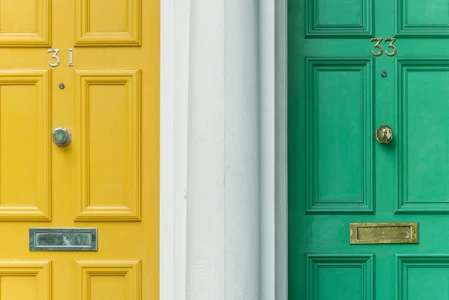If you’ve just moved into your new home, then no doubt you can’t wait to get going with all the exciting things, like choosing colour schemes and putting your own stamp on the place. But there are some practical things that you need to think about too, like your home’s security.
Often when people move into a property, they just make do with whatever security measures the previous owner had put in place or if it’s a new home, there may not be an existing security system. Although it might feel as though there are more pressing priorities, perhaps security should be higher up on the list given the potential consequences. You don’t want to spend time and money filling it with the things you love and making it a home, to then leave yourself vulnerable to burglaries, do you? So, if you’ve recently moved into your new house then now is a great time to review your home’s security measures.
Doors
There are a range of different doors that can help make your home safer. If your property has a UPVC or composite door, you could also consider upgrading to a British Standard TS007 Kitemarked model. Alternatively, you might want to add on a dead-bolt or have smart locks installed as an extra precaution to prevent forced entries.
Windows
Unfortunately, windows many burglars use windows as a common entry point as they aren’t always the safest part of the house (even when locked). There are certain things you can do to reinforce your windows, although some of them may change the look of it, such as security film. That might seem a little drastic but there are other subtle things you can install that do not affect the appearance of your windows, such as sensors that raise an alarm once the glass has been broken.
Lights
Darkness is a burglars best friend, as they can sneak around without being seen. Lighting up the front of your house, down the side and the back garden with sensor flood lights will alert you to any going-ons around your property. Just make sure you position them in the right place so they don’t dazzle your neighbours or any drives coming up or down your road, as they can be very bright.
Gates and fences
Many of us make do with old gates that have seen better days, or fence panels that have been blown out by the wind and are now damaged. This could provide easy access to your property, which of course, you don’t want. If you can’t afford to replace them right now, you could fix two different locks to the gate - one padlock in the middle and a bolt at the top or bottom. You could even consider adding trellis panels to the top of them to make it difficult for intruders to climb over.
Home security systems
Sometimes just having a visible alarm system on your house can be enough of a deterrent to potential burglars - and having one that actively works is even better! Most alarms come with fixtures for inside the house that can detect things like vibrations, movement or forced entry. Once this has been detected, it will raise the alarm that’s kept inside the exterior fixture that sits on the outside of your house.
There are various different types of home security systems available, so make sure you speak to a home security expert like Yale, to ensure you purchase the one that meets your needs.
Sheds, garages and summerhouses
Finally, let’s not forget your outside buildings, such as sheds, garages and summer houses. You might actually have a few valuables in them that you wouldn’t want to provide easy access to. All windows and doors need extra padlocks and bolts (preferably at the top and bottom of the door). You could also add an alarm to these outbuildings - even a battery-operated one will do the job.
Other things to consider
There are a few more basic things you can do to improve the security of your home:
- Gravel driveways to alert you of anyone approaching your house
- Talk to your neighbours - if you have a good relationship with your neighbours, make sure you keep in touch with them as they can keep an eye on your property when you’re out at work or away on holiday.
- Lock down any valuable items that are outside your house e.g. anchor any expensive garden furniture to the floor and fit cable ties to your hanging baskets.
So, what are you waiting for? There’s no time like the present to get started with securing your new home.
We’re currently working with Yale to bring you 20% off any smart home security products if you take out a mortgage with us before the end of 2019.
Important information
Your home may be repossessed if you do not keep up repayments on your mortgage.
There may be a fee for mortgage advice. The actual amount you pay will depend on your circumstances. The fee is up to 1% but a typical fee is 0.3% of the amount borrowed.

